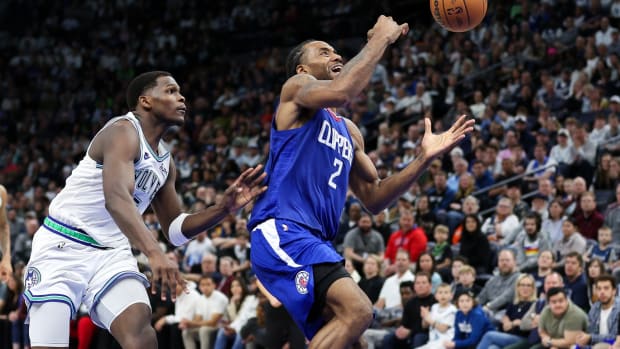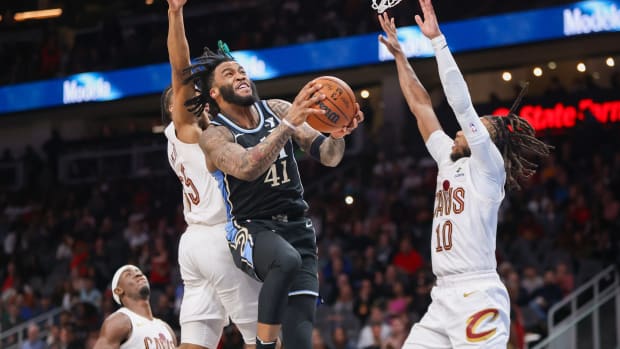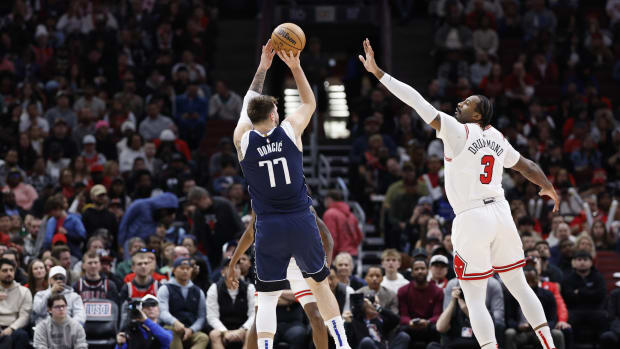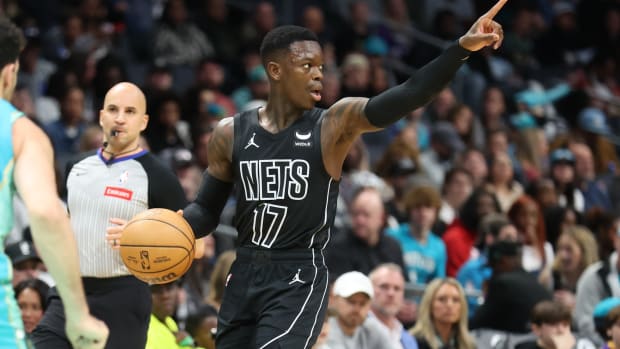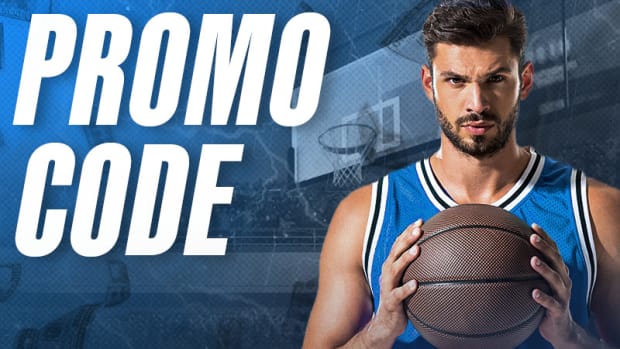Court Vision: LeBron James has a killer instinct all his own
Players like LeBron James should be allowed to define greatness on their own terms. (Kevin C. Cox/Getty Images)
• LeBron James isn't merely the NBA's best player, but also among its most thoughtful. He gave a terrific, frank interview to Chris Broussard of ESPN the Magazine, in which James discusses the nuances of his post game, his relationship with Michael Jordan, and -- oddly enough -- hunting strategy:
When people think about the killer instinct, they always think of MJ and Kobe. Do people underestimate your killer instinct? People say you have it but not like those two. Do you think you have it like they do?
Ahh. I'll just put it this way, man. There are different ways to hunt. I watch the Discovery Channel all the time, and you look at all these animals in the wild. And they all hunt a different way to feed their families. They all kill a different way. Lions do it strategically -- two females will lead, and then everybody else will come in. Hyenas will just go for it. There are different ways to kill, and I don't think people understand that. Everybody wants everybody to kill the same way. Everybody wants everybody to kill like MJ or kill like Kobe. Magic didn't kill the way they killed. Does that mean he didn't have a killer instinct? Kareem didn't either. But does that mean Kareem didn't have a killer instinct? The same with Bird. That doesn't mean you don't have a killer instinct. Tim Duncan don't kill like Michael Jordan and Kobe Bryant, but I've played against Tim Duncan twice in the Finals and I know for sure he's got a killer instinct. So there are different ways to kill. MJ had a killer instinct for sure. But if people really think that MJ didn't talk to nobody and didn't smile on the court, they're crazy. They're crazy. I've seen him. I was watching a clip the other day of him blocking Charles Barkley, and they're laughing about the play -- on the floor. Right now, if I block Kevin Durant on the floor, or I block Carmelo Anthony and we laugh about it? Ahh, I'm going to get killed [laughing]. I'm telling you. But there are different ways of killing.
Brilliantly put. James nails an important lesson with that quote, one that is so often lost in barstool debates over the merits of certain players. Greatness does not come from a rubric. It is not a list of boxes to be checked or a form to be mimicked. All of the greats in any particular field reached those heights on their own terms, and basketball should be no different. Michael Jordan might be the standard in some respects, but others shouldn't be looked down on simply for approaching the game in a different way.
This pull quote is wonderful, but be sure to check out the interview in full.
• Swoon over the frame-by-frame brilliance of Al Horford's face-up game.
• Here's a pretty radical notion: The NBA is considering moving the start times of its games to make them more accessible to international audiences. (via J.E. Skeets)
• Bucks rookie Giannis Antetokoumnpo -- who is having a hell of a preseason -- busted out the Dirk Nowitzki one-footed fadeaway just to boggle our minds. (via Danny Chau)
• On a related note: This picture is an early front-runner for photoshop of the century.
• Grantland's Zach Lowe offers a detailed look at the opportunities that Kawhi Leonard could see within the Spurs offense this season. Without much alteration, there's room for Leonard to spend a bit more time in control of the ball, and for the third-year forward to make plays in read-and-react scenarios. Yet what's most interesting about Leonard is how clearly he deviates from the Spurs' mold; while he plays excellent defense and has become a consistent three-point shooter, he's anything but a stock San Antonio 3-and-D type:
Offensive rebounding wasn't the only un-Spurs-ian thing Leonard pulled when the stakes were highest. He sought easy baskets by leaking out early from defense to offense, sometimes even before the Spurs had secured a defensive rebound — a once-unthinkable no-no for a key rebounder on a Gregg Popovich team. He gambled for steals, bending or breaking classic San Antonio rules that emphasize sound positioning over risk. Leonard won a huge percentage of these bets because he has a sophisticated and hard-to-teach understanding of when in-the-moment conditions — the placement of each player, the trajectory of the ball, the location of a shot — increase his odds of success. What appears reckless is not necessarily so for a player with brains and athleticism. Leonard in this way is the heir to Ginobili as the Spur to whom traditional Popovichian precepts do not always apply.
"Those aren't really Spurs things," Leonard says with a laugh. "But as long as I'm in my spots on the defensive end, Coach gives me some leeway now."
• John Wall is taking names.
• Danny Green is a snake guy. (via Dan McCarney)
• Celtics Hub's Tom Westerholm expresses some minor concern over the early screening work of Celtics rookie Kelly Olynyk. Nothing to fret over just yet, though, especially given how many bigs come into the league as awful screeners.
• Over at KnickerBlogger, Kevin McElroy laid out a thoughtful deconstruction of New York's deal to acquire Andrea Bargnani and the ensuing debate. A snippet of his breakdown:
…a trade can’t only be judged based on the haul that you bring back, it also has to be judged against any other trade(s) that you could have made either 1) using the assets you sent out or 2) in order to bring in the assets you received.
Even if you like Bargnani better than what the Knicks shipped out, you should still consider whether they could have gotten more for their first rounder; after all, this is the last deal the Knicks will be able to make with an unused first-rounder as bait until their 2020 pick becomes available to move. Further, pro-traders should ask themselves whether Toronto really needed all three picks to say “Yes” to the deal. Every indication has been that they were highly motivated to rid themselves of Bargnani’s contract and I think it’s more than reasonable to worry that the Knicks bit down hard on a Masai Ujiri bluff and could have gotten their man for just the second-rounders if they’d held strong. I understand the temptation to say “Screw it, I like Bargs and we got our guy” but asset-optimization considerations like this are what separate run-of-the-mill organizations from great ones. Seriously, could you imagine the Spurs sending a first and two seconds for a player that everyone and their brother knew was not only on the block but had become the most visible holdover from an era that his team was desperate to leave behind?
• Catch ya later, Sebastian Telfair.
• Interesting thoughts here as to why MarShon Brooks might be among the more preferable offensive options in a lackluster Celtics backcourt.
• This terrific piece on the sleep patterns of NBA players -- from Baxter Holmes of The Boston Globe (via Trey Kerby) -- provides some pretty fascinating context to a self-evident truth. As a regular viewer of West Coast NBA games, I was particularly intrigued by the concept of sleep debt:
Several players say they can function on little sleep, but genetically “short sleepers,” as they are known, actually make up about 1 to 3 percent of the population, according to the Wall Street Journal. And out of every 100 people who believe they need only five or six hours of sleep a night, only about five really do, Daniel J. Buysse, a psychiatrist at the University of Pittsburgh Medical Center and a past president of the American Academy of Sleep Medicine, told the Journal.
Mah, who has worked with NBA, NFL, NHL, Olympic, and collegiate athletes, said teams should also consider “sleep debt” — the cumulative effect of sleep loss.
She added that one night of good sleep is not enough to erase, say, a week of poor rest. In fact, she said, it can take weeks to significantly reduce and eliminate sleep debt.
“Just like they focus on their physical training and other types of recovery and nutrition, sleep needs to be something that they prioritize, “ she said.
• Peeking into the playbook of Celtics head coach Brad Stevens.
• C'mon.
































